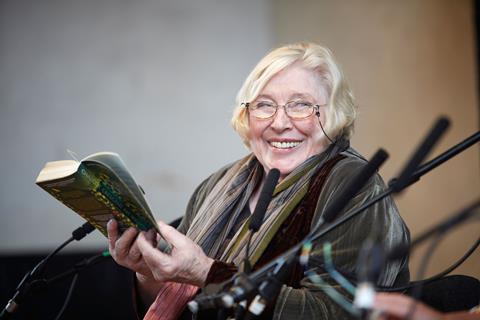Celebrated author and outspoken feminist Fay Weldon found faith later in life through attending a traditional Anglican church. Here, she reflects on what has changed since her encounter with God, and what has stayed the same

Fay Weldon is famous for the feisty feminist femme fatale characters in her novels. ‘Witty’, ‘provocative’, ‘casually libidinous’ are words that have been used to describe her and her writing. We can now add Christian to that list. In the year 2000, at 69 years old, Weldon was baptised in St Paul’s Cathedral. She continues as a working writer and Kehua!, her latest novel, was published in August.
Weldon was happy, determined even, to be interviewed by Christianity magazine in her large house on a windy hillside in Dorset. Two days before the scheduled interview she was in hospital, laid low with a virus which caused heart attack-like symptoms. My advice to postpone was waived aside. She came home. The next day, the hairdresser did her hair and she was ready and smiling as scheduled.
The first impression, as Weldon opened the door, was how short, blond and softly winsome she appears – a smiling, elderly, English, posh-spoken, Marilyn Monroe. As we settled at a little table in one end of her large kitchen, the Thatcher-like intellect and steely core soon became apparent.
What brought you to being baptised?
I was born to humanists, and went to Catholic school when I was small where they prayed seven times a day, although, being unbaptised, I sat out the prayers with my spelling book. The school gave a basic sense of religion and how it relates to me and everything else. I was never averse to it. Fifty years of neglect later, I started going to church again, and I so liked singing the hymns that on impulse I filled in the little slip on the shelf in front of me: ‘If you’d like to get more involved...’ I wrote my name and address and forgot about it. Then I had a call from the vicar and I met him, and getting baptised and confirmed seemed an obvious thing to do. It wasn’t a great moment of enlightenment or sudden conversion. Partly, I think, I wanted to belong.
Another thing that got me going as a Christian, around that time, is that I was being asked to write an introduction to 1 Corinthians. I was more or less converted by St Paul. What he had to say was so new at the time, and yet still so relevant.
I was always very worried about saying the creed, because it’s very literal and they won’t let you take it metaphorically. But one day I said it, and found that I hadn’t been struck by lightning or anything. Now I am used to it and don’t query it at all.
How has your faith developed and grown since then?
We go to church every Sunday at 8 o’clock and once a month we go to another church at 11 o’clock and sing hymns, which I like doing, and meet people. And every now and then, not always, you feel the presence of God. I like the whole sense of history, that people have walked up this particular path for the last 500 years, at least, that you are part of something extremely valuable. If I don’t go I feel as though I’ve missed something.
What reaction have you had to calling yourself, more recently, a Christian?
My daughter-in-law was absolutely terrified of letting my grandchildren near me in case I converted them. People are, oddly, quite shocked because they think it means that you have no intellect. Many are really quite polite, and many turn out to be closet Christians themselves, but never let on. People are almost nervous of saying that they go to church and all the rest of it because it’s somehow, socially, not the thing to do. But you also discover all kinds of people who are Christian, and who are happy to talk about it.
Now there’s a sort of scientist backlash which is trying actually to erase Christianity from the social structure. They say we’re superstitious and old-fashioned. But I find it equally difficult to comprehend what they think is going on in the cosmos.
As a Christian, how do you now view men and women and the feminist movement?
Well, it was a kind of revolution in which one played a part. I think feminism has released all kinds of talents into society. Women now can speak up without having the little squeaky voices which they used to have because they were so nervous and so unused to speaking in public.
But what nobody thought about was what effect it would have on the children. When it was all a man’s world and the women stayed at home there was less sense of a broken society. The women are now, on the whole, happier than they were, it’s just the children who suffer.
But, you know, there are solutions to this. If we could just have a 25 hour week… Any child can be without its mother for 25 hours a week. And it’s not that homes with mothers are automatically nice places to be in. I think some children are probably a lot better off going to day care – but not many. I wouldn’t send mine.
Women being able to earn gives them status, gives them independence, gives them what they need. I think it’s the full time work that’s the problem. Let parents spend less time producing the stuff that nobody needs and more time in the home or taking care of the children.
Do you see faith as an important element in your writing now?
I think in a way I always have. You can’t proselytise, you know. But, to my mind, everything I write has a kind of moral base to it. And, on the whole, virtue is rewarded – though that sometimes depends on how you define virtue.
In the early books, men were actually fair game because they behaved so poorly, from knowing in their hearts that you were a second class citizen. In most households then, the men were older, more educated – women marry up, for status, and men marry down, for looks. You grew up seeing that Mummy didn’t know nearly as much as Daddy, because Mummy was huffing about silly things and Daddy was talking about politics. That has changed, women and men now tend to marry their equals, the whole structure is now different. And men are no longer fair game.
I recently went to Boston and talked to an audience there. I made a list of all the completely unfair things I had written in the past about men and read them out to this crowd of hundreds of mostly young women. Whenever I said anything awful about men, the whole hall erupted into cheers. I could see it was too late. I had done something dreadful – for the world has moved on. Society has changed. Women now have absolute choice about how they live. What goes wrong is not men’s fault. But some women continue, out of habit, to find fault with men. And then they find it difficult to get married because doubt keeps entering in to any relationship.
Do you have characters who go to church and do you describe something of that experience for them?
I don’t do it in the novels, actually, any more than I did feminism in the novels. When I talk at literary festivals, I explain to people that if they take an hour, or an hour and a half, out of their lives every Sunday it is rather better than going to the shopping mall, and certainly cheaper. And to gather together and to pray for the sick does nobody any harm at all and might even do them a great deal of good.
Once you’ve seen it, and once you’ve seen society as it is in its irreligious state, you think that the sooner it gets back to religion the better. If people don’t believe in God they’ll believe in anything, as Chesterton said. If you go to Glastonbury you’ll see them believing in anything – a ruddy waste of time! My mother lived there for a time with the terrible things going on, and she used to say: ‘Where there are angels there are always devils as well.’
How do you view the Bible?
The Old Testament I have little time for, except as literature – and then I have a great deal of time for it. You can’t really approve of Jacob’s character can you? He’s not a very good example of how to live. Then comes the New Testament and everything changes so totally, an account of a life, bringing new ideas, new thoughts and a new connection with God. But there is too little sense of the anger, wrath or majesty of God in today’s Gospel interpretations. It all gets a bit cosy.
When you wrote Sacred Cows you were very critical of the Koran...
Yes I was and it was rather dangerous – and that was written before I was a Christian. Ten years later they declared me an Islamophobe, which was rather nasty. Protestors turned up at literary readings and things. It took them ten years to get round to it.
As a Christian, I cannot believe that the Koran came from anywhere other than Mohammed – who, rather like L Ron Hubbard, created a religion. I might get into trouble for this, but I have my own faith.
There are all kinds of nice ideas and good instructions and peace to all men – except they only count Muslims as men, as human really. And the instructions the Prophet gives to people living abroad are really rather terrible. You make contracts with infidels but then you are at liberty to break them. You smile to their face and you stab them in the back when you can... You shouldn’t be teaching children this kind of thing.
If the Imams could reinterpret the Koran and leave out all the anti-social bits and keep in the good bits, you’d have a religion which would encourage people to live in harmony and peace with one another. From St Paul onwards, Christianity was an inclusive religion. Islam, by its nature, is exclusive.
If you come from a strictly ordered society, I can see that modern England, with its sexual mores and all the rest of it, seems a terrible and shocking place and what a horrible lot we are. And if you look at many of us, we are.
You are an advocate of the beauty of the Book of Common Prayer and traditional worship. Aren’t you locking yourself into one fine old room of the great diverse mansion of the Christian Church?
Yes, I just like it in there. I choose that for myself. Others must go where they find themselves at home.
It is the argument from the aesthetic, from architecture, music. People who built cathedrals and churches were doing it in the honour of God, to build sacred spaces. To ignore this and put up a pre-fab building doesn’t have the same texture as that sense of a history of worship.
The old services are designed like a theatrical performance. You stand, you sing, you say words together, you have a sense of fellowship, you have a tradition, you know what’s going to happen next. You can trust the vicar who reads these words and doesn’t impose his will upon them. If they just ‘do the thing’ you can focus on the words and on God rather than the person at the front.
The local churches seem more like therapy groups – they’re social events rather than spiritual. You never have the feeling that God is actually there. That’s what you go for, for that connection which is part of one’s nature and it’s a great shame to disregard it.
That’s my answer but I could argue the opposite.
Chalcot Crescent gives a very bleak picture of the immediate national future. Do you see it as a prophetic warning?
Oh, completely prophetic. I think that sort of economic collapse will come. I think it’s almost bound to.
In the book there’s no mention of God at all...
No. I think it simply didn’t enter into a picture of the socioeconomic future. Nobody is aiming for the good particularly, though the young ones are aiming for the good in the most unfortunate manner. She, the narrator, decides that they’d better be stopped.
And your next book?
The next book I suspect is equally alarming because it’s about Maori religion. It’s called Kehua! These are the restless spirits of the dead, who are not nasty, but just trying to bring you home where you ought to be. It’s also about the difficulty a writer has in distinguishing a character in a book from a ghost.
I’ve been writing down in the basement. It’s a good place to work because it’s where the work used to get done, by the servants. In the book, the fictional writer, also in her basement, hears china clinking and the odd sigh and so forth. A medium from Glastonbury visits, goes down into the basement and comes back up telling tales, not of ghosts but of the characters in the unpublished novel. The characters seem to have more actual existence than these alleged ghosts. All very nebulous.
It’s not exactly a book which is urging anyone towards the good – though there is an exorcism, in the name of Jesus, which the writer character hears and realises that she is the one being exorcised. So she thinks she’d better finish the book and get out of there. Only the Kehua follow.
I think your readers might appreciate What Makes Women Happy more.
The motto of What Makes Women Happy is ‘Be good and you’ll be happy, be happy and you’ll be good’...
It’s what one’s grandmother used to say. It’s a Victorian sentiment, but it still rings true.
But if you’re aiming to make yourself happy, you won’t necessarily do the right things...
By the end of the book you see that being happy isn’t about all the things cited in the beginning, but is actually about behaving well. The food and the chocolate, the shopping and the casual sex, don’t make people happy, they’re a recompense for the awfulness of life, but they’re not the answer. Going shopping and buying a nice pair of shoes doesn’t actually make you happy, the best it makes you feel is ‘at least I’ve got this.’
In the book you also have quite a relaxed attitude to sex outside marriage, sort of ‘Do it a little and, as long as you don’t make a habit of it, that’s ok’...
Yes, that’s quite alarming to some people. I’m not recommending it, but I’m saying you shouldn’t beat yourself up too much and give up all hope of being good because you think you’ve been so sinful. The thing to do is ‘go, and sin no more’.
But it’s the stories in the book that are important, modern tales with morals, parables if you like. And they’re fun.





































